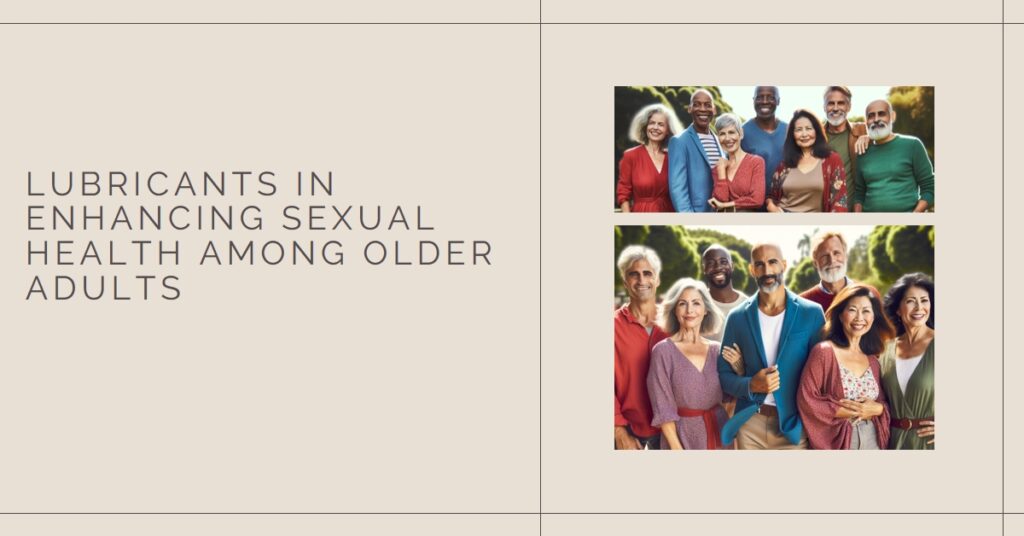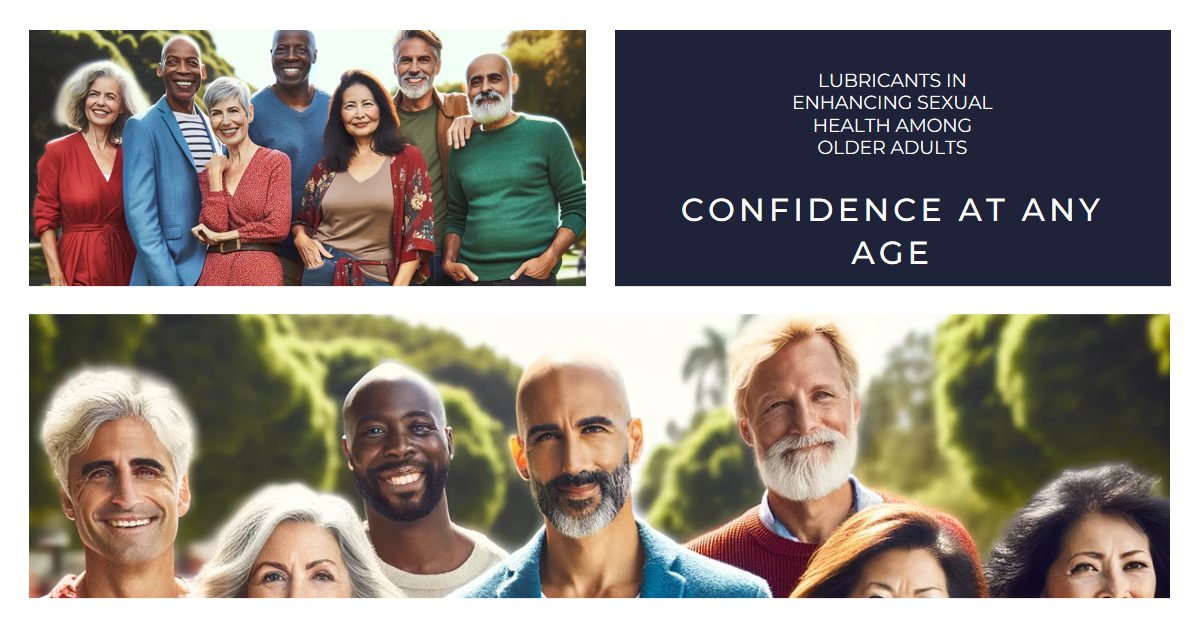The purpose of using lubricants
Sexual health and well-being, essential aspects of our overall quality of life, often receive less attention as we age. This article seeks to answer this crucial question: What is the purpose of using lubricants? It focuses mainly on the importance of lubricants in improving sexual health and happiness in older adults. As a researcher and ageing person myself, I have seen firsthand the effects of ageing on sexual health. Recently, I have taken an interest in reading and researching this topic.
Here, I have gathered insights from several scientific studies to offer information and practical guidance.
Summary: The Role of Lubricants in Enhancing Sexual Health Among Older Adults
The review articles and scientific literature discussed the importance of sexual lubricants in promoting sexual health and well-being, particularly in the context of age-related changes in sexual function. The decline in oestrogen levels during menopause can lead to symptoms such as vaginal dryness, irritation, and dyspareunia, impacting quality of life and sexual intimacy. Lubricants and moisturisers are recommended as first-line treatments for vaginal dryness, providing short-term relief during sexual activity or maintaining vaginal hydration over a longer period. They can improve sexual function, pleasure, and enjoyment for sexually active individuals, particularly those experiencing discomfort or pain during intercourse. Moreover, lubricants are recommended for use with condoms to reduce the risk of condom breakage and enhance protection against sexually transmitted infections (STIs), including HIV.
Various factors, including the presence of particular health conditions and lifestyle factors, influence the use of sexual lubricants and medications to improve erectile function in older adults across different countries. Healthcare professionals are encouraged to initiate discussions about sexual function with their older patients and address sexual health comprehensively.
For women with an insufficient response to hormonal therapy, non-hormonal modalities to reverse urogenital ageing are essential. These include laser therapy, vitamin D and E supplementation, plant-based therapies, lifestyle interventions, pelvic floor muscle training, and electrical stimulation. Oxytocin gel and vaginal dehydroepiandrosterone (DHEA) have shown potential in reversing urogenital ageing and improving symptoms related to vaginal atrophy.
A selective oestrogen receptor modulator called ospemifene has been shown to help postmenopausal women with vulvovaginal atrophy symptoms like vaginal dryness and dyspareunia. It improves vaginal health and sexual function with a favourable safety profile, although it carries a boxed warning regarding endometrial cancer and cardiovascular risk due to its estrogenic properties.
Overall, the articles emphasise the importance of sexual lubricants in addressing age-related changes in sexual health and the potential benefits for improving sexual function, pleasure, and enjoyment. They also highlight the need for further research to strengthen the evidence base, understand values and preferences, and assess the cost-effectiveness of lubricants in the context of age-related changes in sexual health.
Ageing inevitably brings changes that can impact our sexual experiences. One significant change, especially among postmenopausal women, is decreased natural lubrication. While this might seem trivial, it profoundly affects comfort, pleasure, and the overall quality of life. Lubricants emerge as a simple yet effective solution to this issue.
Reading the selected papers has been an eye-opener for me; they highlight the significant role lubricants play in enhancing sexual experiences. Not only do they alleviate discomfort, but they also greatly enhance pleasure and safety during intimacy. Through this discovery, I’ve realised the importance of using lubricants to ensure that sexual activities continue to be a delightful and connecting experience, regardless of age. The links to the included publications are added below for those interested to check for themselves.
The relevance of this topic extends beyond individual well-being. As we age, maintaining an active and healthy sexual life is crucial, and lubricants can be instrumental in this regard. Our exploration includes findings from various studies, illustrating how the proper lubricant can enhance pleasure and contribute to safer sexual practices, such as reducing the likelihood of condom breakage.
But this review isn’t limited to the physical aspects of lubricant use. It also delves into the psychological and social implications, exploring why people may choose to use or avoid lubricants. Additionally, we look at how lubricants fit into the lives of those managing common age-related health conditions like diabetes or cardiovascular diseases.
Furthermore, for those seeking alternatives to traditional options, we explore non-hormonal methods to enhance sexual well-being, including laser therapy and vitamin supplements. This variety of emerging treatments offers new avenues for managing sexual health among older adults.
This article is for everyone affected by these issues, personally or through someone they know. It aims to demystify a topic that is critically important but often ignored. Let’s foster a more open and informed conversation about sexual health in our golden years, where ageing and sexuality are discussed with the honesty and respect they deserve.
Lubricants for the promotion of sexual health and well-being
The first publication we will look at is entitled Lubricants for promoting sexual health and well-being: a systematic review. By Caitlin E. Kennedy and colleagues.
A systematic review is a thorough, top-to-bottom examination of all the research available on a particular question, done to provide a clear answer based on the best evidence out there.
The comprehensive review of scientific literature on the importance of sexual lubricants as we age highlights the potential benefits of lubricant use for improving sexual health and well-being. The review emphasises the possible role of lubricants in addressing age-related changes in sexual health, particularly in individuals experiencing vaginal dryness associated with menopause, dyspareunia, or engaging in anal sex. The review also underscores the potential of lubricants to facilitate optimal sexual function, pleasure, and enjoyment for sexually active individuals, regardless of specific health conditions.
Key findings from the review include:
- Lubricants may result in improved sexual health and well-being, particularly for individuals experiencing vaginal dryness associated with menopause and dyspareunia.
- The use of lubricants may facilitate optimal sexual function, pleasure, and enjoyment for sexually active individuals across genders, regardless of specific health conditions.
- Lubricants have been recommended for use in conjunction with condoms to reduce condom breakage and provide better protection against sexually transmitted infections (STIs), including HIV.
- The review identified limited evidence from randomised controlled trials (RCTs) and observational studies, with findings suggesting that lubricant use was associated with improved female sexual well-being and reduced pain and discomfort during sexual activity.
- Values and preferences studies highlighted a range of reasons for using lubricants, including comfort, reduced dryness/pain/discomfort, increased pleasure, and partner preference. Reasons for not using lubricants included perceived stickiness, expense, and unavailability.
- The review did not identify any cost studies meeting the inclusion criteria, indicating a need for further research on the cost-effectiveness of lubricants for improving sexual health and well-being.
Overall, the review emphasises the potential benefits of lubricant use in promoting sexual health and well-being, particularly for individuals as they age. However, the review also highlights the need for further research to strengthen the evidence base and address gaps in understanding lubricants’ effectiveness, values, preferences, and cost-effectiveness in the context of age-related changes in sexual health.
Older Adults’ Use of Lubricants and Medications to Enhance Erectile Function
The scientific paper European Older Adults’ Use of Lubricants and Medications to Enhance Erectile Function provides insights into the use of sexual lubricants and medications to enhance erectile function in older adults. It highlights the prevalence of sexual difficulties in older adults and the barriers they face in seeking help for these issues. The paper emphasises the importance of addressing sexual health in older adults and the need for healthcare professionals to initiate discussions about sexual function with their older patients.
The study found that the use of sexual lubricants and medications to enhance erectile function varies across different countries. In men, the use of drugs to improve erectile function was significantly higher in those with prostate cancer, cardiovascular diseases, and diabetes. The likelihood of using medication also increased with higher alcohol consumption and more frequent sexual activity. In women, the use of lubricants was significantly higher in those experiencing pain difficulties during intercourse and those on hormone replacement therapy.
The study also noted that women’s reporting of lubricant use was systematically higher than men’s reporting, and men’s reporting of medication use was systematically higher than women’s reporting.
The paper emphasises the need for healthcare professionals to address sexual health in older adults and to take sexual difficulties seriously. It also highlights the importance of understanding the cultural and individual differences in the use of sexual lubricants and medications among older adults.
Overall, the paper provides valuable insights into the use of sexual lubricants and medications in older adults, highlighting the need for further research and attention to sexual health in this population.
- Older adults are 1.5 times more likely to use lubricants than younger adults.
- 43% of American adults have used a personal lubricant at some point in their lives, and 16% reported using one within the last month.
- Women are two times more likely to use lubricants than men.
- 22% used lube every time they had sex, while 32% used it most of the time.
- 29% sought out lubricants without parabens, and 25% reported seeking out lubricants without glycerin.
- 60% of LGBTQ+ adults reported using personal lubricants, compared to 37% of heterosexual adults.
- 8 out of 10 gay men have bought and used lube for sexual activities.
- 5 out of 10 millennials (born 1980-1995) have bought and tried lubricant.
Source: Bedbible.com
Non-oestrogenic modalities to reverse urogenital ageing.
The next study we included is entitled Non-oestrogenic modalities to reverse urogenital ageing by Garzon and colleagues. The urogenital ageing process in women is primarily caused by oestrogen deprivation following menopause, leading to symptoms of the genitourinary syndrome of menopause (GSM). These symptoms include vaginal dryness, irritation, tenderness, pain during intercourse, urinary urgency, frequency, and incontinence.
Hormonal therapy, particularly local oestrogen, is the standard effective treatment for moderate-to-severe genitourinary symptoms. However, for women with insufficient responses to hormonal therapy, non-hormonal modalities to reverse urogenital ageing are essential.
Moisturisers and lubricants are commonly used to alleviate symptoms related to urogenital ageing, such as dryness, irritation, and pain during intercourse. While moisturisers are used regularly to relieve symptoms, lubricants are applied during intercourse to reduce pain and post-coital irritation. However, these products do not reverse urogenital ageing; they only provide temporary relief.
Non-hormonal therapies that have been investigated for their potential to reverse urogenital ageing include laser therapy, vitamin D and E supplementation, plant-based therapies, lifestyle interventions, pelvic floor muscle training, and electrical stimulation. Laser therapy, mainly fractional micro ablative CO2 and non-ablative photothermal erbium: YAG lasers, has shown promise in improving symptoms related to vulvovaginal atrophy. Vitamin D and E supplementation and plant-based therapies have shown conflicting evidence regarding their effectiveness in reversing urogenital ageing.
Lifestyle interventions, such as regular sexual intercourse, smoking cessation, weight loss, and pelvic floor muscle training, have been reported to improve symptoms related to urogenital ageing. However, their effects on reversing urogenital ageing are not clearly established.
Among the non-hormonal therapies, oxytocin and dehydroepiandrosterone (DHEA) have shown potential in reversing urogenital ageing. Oxytocin gel has been associated with improved vaginal epithelium and relief of symptoms related to vaginal atrophy. Vaginal DHEA has been approved for the treatment of dyspareunia in postmenopausal women and has demonstrated efficacy in reducing pain during sexual intercourse. Oral ospemifene, which is a selective oestrogen receptor modulator, has also been shown to help postmenopausal women with vaginal dryness and heavy periods.
In conclusion, while hormonal therapy, particularly local oestrogen, remains the standard treatment for genitourinary symptoms related to urogenital ageing in postmenopausal women, there is a growing body of evidence supporting the use of non-hormonal therapies for those who are unable or unwilling to use hormonal treatments. Moisturisers and lubricants provide symptomatic relief for vaginal dryness, irritation, and pain during intercourse, but they do not address the underlying changes in urogenital tissues.
Non-hormonal therapies, like laser therapy, vitamin D and E supplements, plant-based therapies, lifestyle changes, pelvic floor muscle training, and electrical stimulation, can help manage symptoms in other ways and may even help reverse some signs of urogenital ageing. Oxytocin gel and vaginal DHEA have shown promise in improving vaginal health and reducing symptoms of vaginal atrophy. Oral ospemifene has also become a valuable treatment for dyspareunia and vaginal dryness, giving people who want to use drugs that are not hormone-based an option.
Healthcare providers need to consider the individual needs and preferences of postmenopausal women when discussing treatment options for GSM. A multidisciplinary approach that includes both hormonal and non-hormonal therapies may offer the most comprehensive management of urogenital ageing symptoms, improving quality of life and sexual function for affected women.
Further research is needed to fully understand the long-term effects and safety profiles of these non-hormonal treatments and to explore new therapeutic options that may arise.
Induced Dryness Stress on Human Vaginal Epithelium: The Efficacy of a New Vaginal Gel
The study entitled Induced Dryness Stress on Human Vaginal Epithelium: The Efficacy of a New Vaginal Gel by Stabile and colleagues provides information on the importance of sexual lubricants for women experiencing menopause-related changes in sexual health. It highlights the prevalence of genitourinary syndrome of menopause (GSM) and the impact of vaginal dryness on quality of life.
The use of vaginal lubricants and moisturisers is recommended as a first-line treatment for vaginal dryness, especially for women who cannot or choose not to use oestrogen therapy. The difference between vaginal lubricants and moisturisers is explained, with lubricants providing short-term relief during intercourse and moisturisers maintaining vaginal hydration over time. The effectiveness of hyaluronic acid-based vaginal moisturisers is emphasised, and the potential benefits for women with vulvar, vaginal atrophy and dryness are discussed.
The background information also talks about an experiment that used reconstituted human vaginal epithelium (HVE) to model vaginal dryness to see how well a particular product, Respecta® Hydragel, works at easing the symptoms of vaginal dryness. The product is meant to control the water flow and raise the expression of CD44 and AQP3, which are all connected to the distribution of hyaluronic acid in the extracellular matrix. This will make the vaginal mucosa deeply hydrated and flexible.
The study suggests that Respecta® Hydragel has demonstrated efficacy in counteracting vaginal dryness and restoring homeostasis in the vaginal epithelium.

Conclusion: What is the purpose of using lubricants?
Overall, the background knowledge provides a comprehensive overview of the importance of sexual lubricants, particularly vaginal moisturisers, for women experiencing age-related changes in sexual health, such as vaginal dryness associated with menopause. It also highlights the potential benefits of specific products, such as Respecta® Hydragel, in addressing these age-related changes.
Sexual lubricants play a critical role in maintaining sexual health and well-being as individuals age, particularly for women experiencing the genitourinary syndrome of menopause (GSM) and vulvovaginal atrophy (VVA). The decline in oestrogen levels during menopause can lead to symptoms such as vaginal dryness, irritation, and dyspareunia (painful intercourse), which can significantly impact the quality of life and sexual intimacy [1] [4].
Lubricants and moisturisers are often recommended as first-line treatments for vaginal dryness, especially for those who cannot or choose not to use oestrogen therapy [5]. While lubricants provide short-term relief during sexual activity, moisturisers are designed to maintain vaginal hydration over a more extended period. The use of these products can improve sexual function, pleasure, and enjoyment for sexually active individuals, and they are particularly beneficial for those experiencing discomfort or pain during intercourse [1].
In addition to providing symptomatic relief, lubricants are also recommended for use with condoms to reduce the risk of condom breakage and enhance protection against sexually transmitted infections (STIs), including HIV [1]. This is particularly important for older adults, who may not consider STIs a risk factor but are still susceptible.
Different things, like prostate cancer, heart disease, diabetes, alcohol use, and how often men and women have sex, as well as problems with pain during sex and hormone replacement therapy in women, affect how sexual lubricants and medicines are used to improve erectile function in older adults in different countries [2]. This indicates a need for healthcare professionals to initiate discussions about sexual function with their older patients and address sexual health comprehensively.
For women with an insufficient response to hormonal therapy, non-hormonal modalities to reverse urogenital ageing are essential. These include laser therapy, vitamin D and E supplementation, plant-based therapies, lifestyle interventions, pelvic floor muscle training, and electrical stimulation. Oxytocin gel and vaginal dehydroepiandrosterone (DHEA) have shown potential in reversing urogenital ageing and improving symptoms related to vaginal atrophy [3].
Ospemifene, a selective oestrogen receptor modulator, has been shown to effectively treat VVA symptoms, including vaginal dryness and dyspareunia, in postmenopausal women. It improves vaginal health and sexual function with a favourable safety profile [4]. However, it carries a boxed warning regarding endometrial cancer and cardiovascular risk due to its estrogenic properties.
[1] Lubricants for the promotion of sexual health and well-being: a systematic review.
Caitlin E. Kennedy, Ping Teresa Yeh, Jingjia Li, Lianne Gonsalves and Manjulaa Narasimhan (2022), Lubricants for the promotion of sexual health and well-being: a systematic review, Sexual and Reproductive Health Matters, 29:3, DOI: 10.1080/26410397.2022.2044198
[2] European Older Adults’ Use of Lubricants and Medications to Enhance Erectile Function; Bente Træen, Gert Martin Hald, Nantje Fischer & Erick Janssen (2020) European Older Adults’ Use of Lubricants and Medications to Enhance Erectile Function, International Journal of Sexual Health, 32:2, 81-93, DOI: 10.1080/19317611.2020.1749210
[3] Non-oestrogenic modalities to reverse urogenital ageing; Garzon, S., Apostolopoulos, V., Stojanovska, L., Ferrari, F., Aydogan Mathyk, B., and Simone Laganà, A. (2021). Non-oestrogenic modalities to reverse urogenital ageing. Menopause Review/Przegląd Menopauzalny, 20(3), pp.140-147. https://doi.org/10.5114/pm.2021.109772
[4] Induced Dryness Stress on Human Vaginal Epithelium: The Efficacy of a New Vaginal Gel; Stabile, G.; Ricci, G.; Scalia, M.S.; De Seta, F. Induced Dryness Stress on Human Vaginal Epithelium: The Efficacy of a New Vaginal Gel. Gels 2021, 7, 157. https://doi.org/10.3390/gels7040157
Best Lubricant for Over 50: Finding the Perfect Vaginal Moisturiser during Menopause






